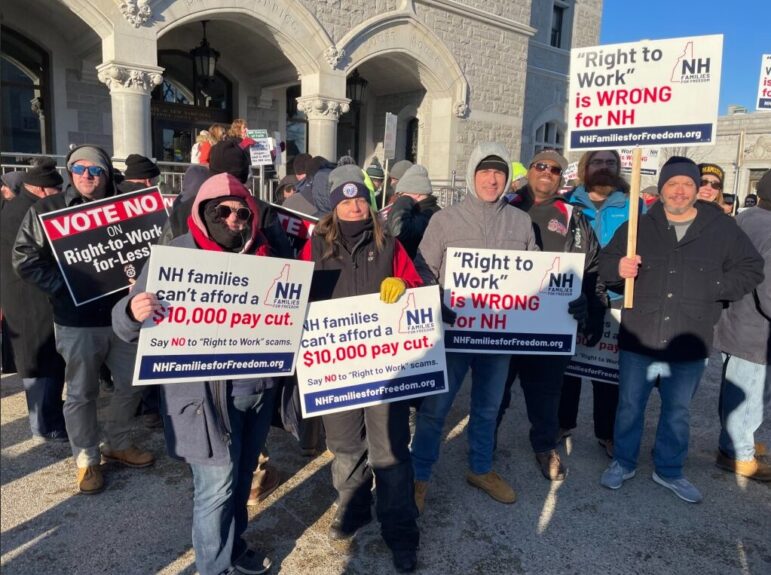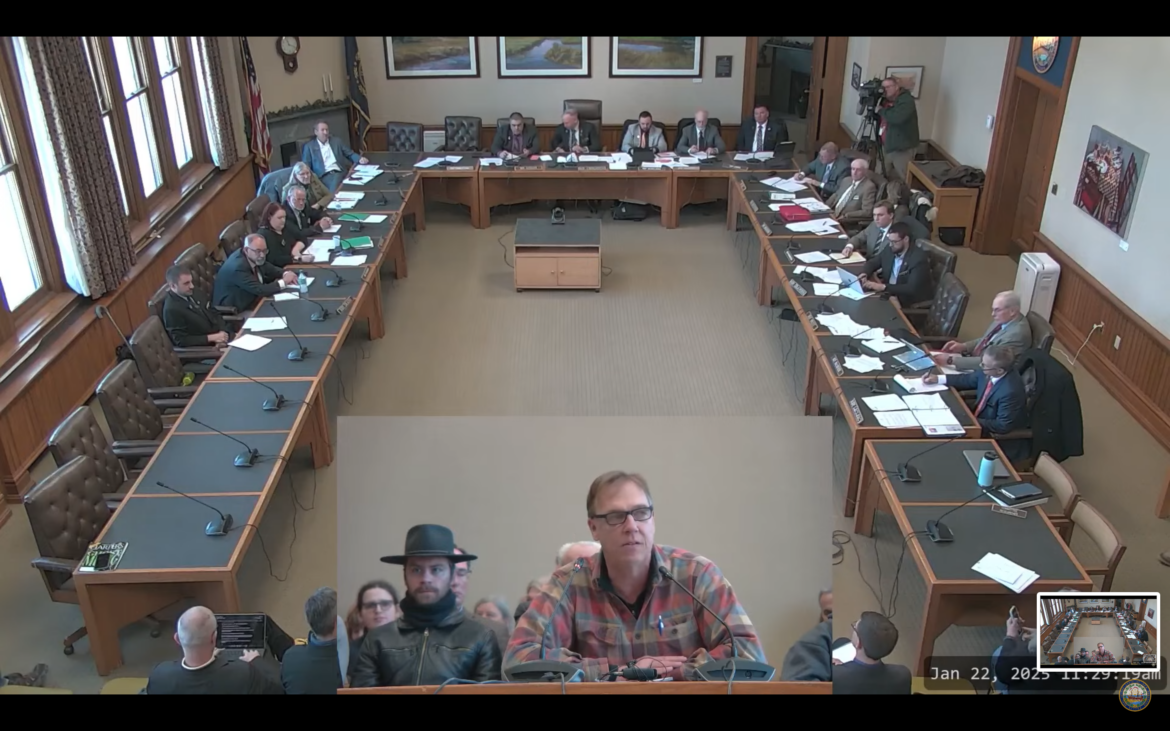
Above, union supporters protested House Bill 238 Wednesday. Courtesy photo
By GARRY RAYNO, InDepthNH.org
CONCORD — Opponents of the latest “right-to-work” bill said it was Ground Hog Day again with the unpopular provision that failed time and time again to become law in New Hampshire.
The public hearing on House Bill 238, which would make New Hampshire the 27th right-to-work state in the country and the only one in the Northeast north of West Virginia, drew an overflow crowd Wednesday as union members and officials, business organizations, faith groups and other advocates turned out to oppose it, greatly outnumbering those testifying in favor of the bill.
Under the bill, workers in union shops would not be required to join a union or forced to pay dues or agency fees for the cost of negotiating and administering a collective bargaining contract.
Many testifying noted no one is required to join a union today under federal law, and public employees do not have to pay agency fees for contracts negotiated on their behalf. And they said the bill attempts to address a problem that does not exist in a state with low union representation of only 9 percent in private business in the state.
The opponents said the bill is a veiled attempt to break labor unions and tilt the scale in favor of employers to reduce wages and benefits for workers in a race to the bottom.
Others opposed said the bill would have the government interfere in negotiations between private business and workers.
Lisa Beaudoin, executive director of the New Hampshire Council of Churches, said her group opposes the bill because people of faith uphold the dignity of workers and justice for all.
“This legislation is not a harm just to individuals,” Beaudoin said, “but to the moral fabric of New Hampshire.”
Supporters of the bill told the committee right-to-work states have lower unemployment, greater job and economic growth and acknowledge the rights of workers not to pay dues or fees. They claimed right-to-work would make unions more responsive and representative of their members, who would have greater influence.
Although many of those contentions were challenged by opponents, the supporters maintained businesses are lined up waiting to come to the state if the bill passes.
Greg Moore of American for Prosperity, a Koch Foundation funded organization, said when he was chief of staff for the House in 2011 and both the House and Senate passed right-to-work but it was vetoed, businesses would come to the House Speaker’s Office and say they would come to New Hampshire once it passed, but he wouldn’t say who the businesses were because they did not want to go public until the bill passed. The legislature failed to override the veto.
He likened the current situation to going into a restaurant and ordering a Caesar salad but getting a cheeseburger, but you are told you have to pay for the Caesar salad.
Under federal law, Moore said, if 50 percent of workers plus one decide to establish a union, the minority loses all their rights and have no way — except decertifying a union — to challenge the exclusive representation of the union.
Rich Gulla, president of the State Employees Association, refuted many of the proponents’ assertions, saying the West Virginia governor said they passed right-to-work and waited for the companies to come and they are still waiting.
“In essence, Right-to-Work undermines the democratic freedoms and constitutional rights of employees, a stance that every legislator in New Hampshire should reject,” Gulla said. “These laws deprive workers of freedom and flexibility, sacrificing job security and benefits.”
Rep. Thomas Oppel, D-Canaan, chided supporters of the bill saying it attempts to deceive people.
“This bill is an attempt to divide and confuse, it has nothing to do with real rights and nothing to do with real work,” he said. “It would simply allow a few to benefit at the expense of others and it undermines the competitive balance workers seek to achieve through free market collective action.”
A number of union workers testified to the benefit of joining unions because of better wages, workplace safety, benefits, and health insurance, and training. A number of those testifying said a union job changed their lives and gave them opportunities they never thought possible.
Several told of having cancer but receiving the best health care due to their health insurance required under their union contract and others told of the education they received at facilities like the carpenters’ training facility in Manchester, while yet others noted worker safety is the unions’ chief concern.
Mike King, a retired ironworker who was in the field for 22 years, said he retired with a pension, an annuity and healthcare. He said he did well investing his retirement benefits creating generational wealth.
“I refer to it as my pot of gold,” King said. “With non-union members, the only one who retires with a pot of gold is the business owner.”
He noted Manchester has the hottest real estate market in the country. “We did all that without right-to-work, we don’t need right-to-work.”
But John Kalb vice president of the National Right-to-Work Committee who lives in Berlin, told lawmakers states with similar laws have seen 16 percent job growth since the pandemic while New Hampshire lags behind at 5 percent, and he noted Oklahoma passed right-to-work and went from being ranked in the 40s nationally in job growth to near the top.
Without right-to-work, Kalb told the committee, workers have no choice, they have to pay union dues for a union job or they do not have a job.
“No private organization should be able to take away someone’s job.” Kalb said. “Freedom to associate is meaningless without the freedom to not associate.”
Opponents say all workers benefit, Kalb said, but noted in 2009 the State Employees Association refused to negotiate furloughs resulting in hundreds of less senior workers losing their jobs.
John Reynolds, state director of the National Federation of Independent Businesses, said the bill will allow the state’s small businesses he represents to determine their own fate with their employees.
He cited a Harvard University study that received much discussion at the hearing, with many saying it was never peer reviewed and not done under the university’s banner. The study compares abutting counties in states that have right-to-work with those that don’t, showing the right-to-work counties doing better economically with higher wages, higher population growth, more manufacturing and lower rates of poverty.
Opponents of the legislation said the study has long been debunked and has never been published.
Reynolds said 82 percent of the small businesses in New Hampshire favor right-to-work, although he acknowledged that number came from a yearly survey of the organization’s members.
Pamela Ean of Concord strongly supported the bill saying it is about liberty and freedom.
She said as a public school teacher in Concord she had to pay agency fees to her union but was able to get a religious exemption to allow her to donate her fees to a charity, but the union wouldn’t approve the charity.
Ean said she is Catholic and looked into teaching at local Catholic schools, but the pay was lower than her salary at public schools.
She said the federal union act forced everyone to pay for collective bargaining costs, even if they did not join the union.
“The federal government created this problem,” Ean said, “it is up to this body to tell the federal government we are not doing that.”
When asked if she accepted the benefits under the union contract, she said she did. “I was a single parent, every cent counted,” Ean said.
But former Rep. Michael McCarthy, a Nashua Republican, and a member of the International Brotherhood of Electrical Workers, said the bill has consequences for unions.
He compared labor dues to those paid to homeowners or condo associations for mowing lawns, plowing snow etc.
People can choose not to live there if they don’t want to pay the dues, he said, but if the association provides services without getting fees they would go bankrupt.
McCarthy wondered if the business organization testifying in favor of the bill would be willing to provide services to businesses who did not pay that group.
Mark Hayward of Manchester, a member of the New Hampshire News Guild, said it is a myth that someone is forced to remain in a union with no recourse.
“A union is a small ‘d’ democracy,” he said, and if you have objections to work rules or merit pay you should do what lawmakers do and run for office in order to change things.
He noted lawmakers run every two years to try to change things, but noted “working for a union, you do a little better than $100 a year,” referring to what lawmakers are paid.
Rep. Michael Granger, R-Milton Mills, asked what about the person who does not want to get involved in politics
Hayward said, “whatever their concern is, is not that important (to them).”
That is like saying you do not want to participate, so you don’t vote and believe everything will be fine.
Other opponents said right-to-work is not right for New Hampshire and would allow the government to interfere in negotiations between businesses and their workers, something not often supported in the Live Free or Die state.
One person testifying said chasing cheap labor, which is what right-to-work is, is nothing more than a race to the bottom.
He said the once empty Millyard buildings in Manchester attest to the practice as the textile industry all moved to South Carolina and now those businesses have moved manufacturing to Mexico or Southeast Asia chasing cheap labor.
“This bill is bad for American workers and bad for New Hampshire,” said Teamsters business agent Keith Judge of Hooksett. “We have fought this for years and it always gets shot down.”
He said in his work he really does not see a worker shortage.
The businesses that use union workers with “the best wages and best working environments are not short staffed, they’re not looking for workers,” Keith said.
The House electronic portal for filing testimony and positions on bills, indicated 1,415 people opposed to the bill and 82 in favor.
The Labor, Industrial and rehabilitation Committee will decide what recommendation to make on the bill at 10 a.m. Jan. 28th in Room 307 of the Legislative Office Building.
Garry Rayno may be reached at garry.rayno@yahoo.com.





